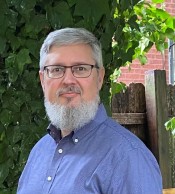Can the Bible Help Suffering People?
A Story of Transformation Through Reading Scripture
Theory: The most Bible-engaged people in your church are those who have suffered the most.
Have you found this true? If so, why is it true? Perhaps we are seeing the reality of the first Beatitude, “Blessed are the poor in spirit” (Matthew 5:3a NIV)—or, as the CEV translation puts it, “God blesses those people who depend only on him.” When people’s spirits are crushed and they turn to God in Scripture, they experience healing. They realize this encounter with God is always available and they keep coming back.
As we have explored new Bible engagement models at American Bible Society, we have seen this played out in trouble spots around the world. People in crisis find spiritual healing in God’s Word, developing an ongoing interaction with God that has dramatic effects on the surrounding community.
The Widows of Dungu
Democratic Republic of Congo has 77 million people, only 260 mental health professionals, and dozens of militias working methodically to destroy its society.
In 2009, after militia attacks in the area, the town of Dungu, population 30,000, doubled in size, largely from widows and orphans seeking refuge.
The churches asked for help. They did not know how to respond to their people’s strange symptoms from complex trauma and PTSD. Bible Societies joined with other NGOs to provide a holistic intervention of practical aid for widows while training churches to provide spiritual and psychosocial support. They used trauma healing materials designed to provide best practices in mental health in a biblical framework.
From the Bible, the widows of Dungu learned of God’s love for them and a biblical hermeneutic for suffering. They were freed to express their pain through biblical lament. They learned to bring their pain to Jesus. Then they learned practical steps to forgive the perpetrators.
From Suffering to Healing & Empowerment
Consistently, those who moved into forgiveness found that trauma-induced flashbacks and fatigue and fury soon become part of their past. Forgiveness was their expression of a new identity, a release of the bitterness that held them hostage. They named themselves not victims but people God loves and calls.
They were ready to start over—and they reached out to help others. Trauma healing small groups became ongoing widows’ Bible studies. The Bible studies requested pastoral support. Now fourteen new churches have begun—evangelical, Catholic, Anglican, Pentecostal. Existing churches grew too. Lapsed Christians came back to church.
The widows began to organize. They formed microenterprise cooperatives. Soon their churches began to work together across denominational lines for the first time in the country’s history. The widows became a recognized cultural force lauded by the Catholic bishop and the town government.
After three years, it is no exaggeration to say that the town has been transformed. Bringing the Bible in a practical form to a marginalized group began a persistent widow-led revival. And it is spreading. We hear similar stories from across the globe—even in the U.S.
Trauma in Our Congregations
What can we learn from these events half a planet away?
Granted, the people in our congregations may not be facing the level of atrocities found in Dungu. But many of our people have experienced trauma in one way or another. There are wounds of the heart from abuse or disaster, often carried, hidden and hopeless, for decades. It would be a mistake to ignore these needs. People need encouragement, even permission, to speak of their pain.
Around the world, people living the aftermath of atrocities find that the Bible sustains them when nothing else can. It stands up to the pressure of providing meaning and identity. It gives them confidence not only to get up in the morning but to rebuild relationships and communities and cultures—to invite people into their experience of God’s healing and reconciling love. Do we have the courage to trust the God of the Bible with the suffering in our own communities? Can we help our people encounter themes of healing, reconciliation, identity, meaning, and new life?
Moving Forward
In Congo, honesty about suffering has helped widows exercise the courage to embrace a new identity in Christ. Their transformative engagement with the Bible includes as much pain as promise—through reading Ecclesiastes and Job alongside Proverbs, and reading more of Jeremiah than just the promise of 29:11—all grounded in God’s perfectly faithful love modeled in the vindicated suffering of Jesus Christ.
Such an approach may help us all establish a sustainable identity in Christ that provides resilience in the face of attacks or setbacks, giving us a standpoint from which to love our enemies. These approaches may also help us recover the freedom of full confidence in the Scriptures so we can share them with a hurting world (Ps 119:45-46).

Peter Edman
Peter Edman is director of content and quality assurance for American Bible Society and executive editor of the Faith and Liberty Bible. He holds a master’s degree in religion and literature from Yale Divinity School. He and his family live in Philadelphia.
Thanks to the support of our faithful financial partners, American Bible Society has been engaging people with the life-changing message of God’s Word for more than 200 years.
Help us share God's Word where needed most.
Connect with our Bible engagement blog for leaders and receive a Bible-reading Habit Guide for your community.









